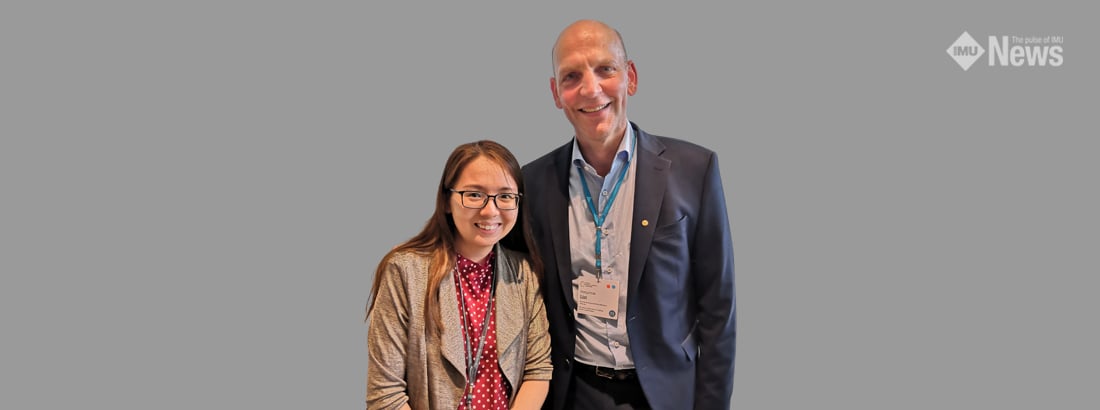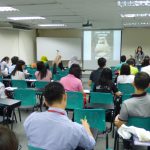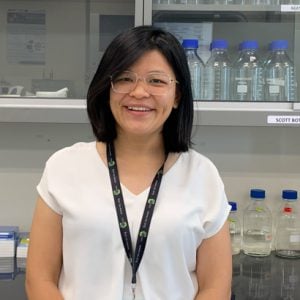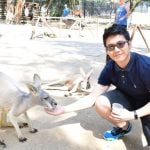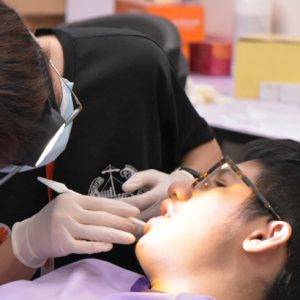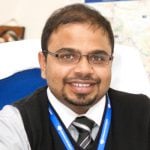Dr Low May Lee (in the photo above on the left with Prof Benjamin List) from the Department of Pharmaceutical Chemistry, School of Pharmacy, IMU, were one of seven young scientists who were selected to represent Malaysia at the 71st Nobel Laureate Meeting in Lindau, Germany, held from 26 June until 1 July. These scientists were among about 600 young scientists from all over the world attending the meeting that was held physically. Dr Low shares with us her experience at the Meeting in Lindau.
About Lindau Nobel Laureate Meeting
The Lindau Nobel Laureate Meetings is a globally recognised exchange platform between Nobel Laureates and young scientists held annually in Lindau, Germany since the idea was established in 1951. The theme of the Lindau Meetings alternates between the three Nobel Prize scientific disciplines (Physics, Chemistry or Physiology/Medicine) with an interdisciplinary meeting taking place every five years whereas the meeting on Economic Sciences is held every three years.
This year, the 71st Lindau Nobel Laureate Meeting dedicated to Chemistry took place from 26 June to 1 July 2022. With the vision to “Educate, Inspire, Connect”, a total of 600 most qualified young scientists were selected by the scientific review panel of the Council for the Lindau Nobel Laureate Meetings to experience and contribute to the unique atmosphere of this years’ Lindau Meeting. It is a wonderful once-in-a-lifetime opportunity for the participants to meet around 35 Nobel Laureates where the laureates will present their research, reflect their career and talk to the selected young scientists. The meeting also provides an avenue for participants to gain knowledge as well as enhance interaction with peers from all over the world.
I am truly grateful to the Academy of Sciences Malaysia (ASM), Council for the Lindau Nobel Laureate Meetings and International Medical University (IMU) for the amazing opportunity and support to attend the meeting on-site.

It is certainly an enriching experience. I am also very honoured to represent Malaysia in the meeting along with six other fellow Malaysians selected (Dr Nur Azzalia Kamaruzaman, Dr Enis Nadia Md. Yusof, Dr Sazlinda Kamaruzaman, Dr Norshahirah Mohamad Saidi, Dr Goh Choon Fu and Dr Oh Wen Da).
The Programme
The six-days meeting offered interesting and exciting varied scientific programme for the participants based on the principle of dialogue and to activate the exchange of knowledge, ideas, and experience between and among Nobel Laureates and young scientists. The different formats include:
Lectures
Nobel Laureates delivered educative and inspiring lectures related to their scientific research
Agora talks
One Nobel Laureate and a moderator will discuss a topic of the laureate’s choosing and participants were given the opportunity to ask questions in an open forum setting.
Open Exchanges
Each Nobel Laureate will chair an open, intimate, informal exchange session accessible exclusively to the young scientists in which the discussion can include personal questions, controversial reflections, and in-depth specialist analyses.
Next Gen Science
10 minutes research presentation by selected participating young scientists, followed by a short Q&A session with the audience.
Panel Discussions
High-profile panel discussions on topical and meaningful issues as well as state of affairs in challenging fields of research.
Science Walks / Laureate Lunches
A Nobel Laureate spend time exploring picturesque spots in Lindau and its surroundings together with ten young scientists or sit together with up to ten young scientists at a local restaurant in Lindau for informal discussion.

The opening ceremony kicked off with welcoming speech by Countess Bettina Bernadotte, President of the Council for the Lindau Nobel Laureate Meetings and other delegates. It was followed by a lecture by Sir David WC MacMillan (Nobel Prize in Chemistry 2021 for the development of asymmetric organocatalysis) on The Path to Invention and Discovery in Catalysis, as depicted in the photo on the left.
There was also a panel discussion session on Trust in Science, Trust in Chemistry with Nobel Laureates Prof Venki Ramakrishnan (Nobel Prize in Chemistry 2009 for studies of the structure and function of the ribosome) and Prof Brian P Schmidt (Nobel Prize in Physics 2011 for the discovery of the accelerating expansion of the Universe through observations of distant supernovae). After that, the participants were also invited to YS Opening Concert: Ensemble of the Vienna Philharmonic Orchestra at Stadttheater, Lindau.
In the days that followed, the programme was very much filled with daily lectures, Agora Talks and Open Exchange. It is hard for me to single-out a favourite session as each one of them was enlightening and inspiring in their own way. Nonetheless, as a bioinorganic chemistry researcher myself, I am particularly intrigued by the lecture sessions by Prof Ben L Feringa (Nobel Prize in Chemistry 2016 for the design and synthesis of molecular machines) on The Joy of Discovery and Prof Jean-Marie Lehn (Nobel Prize in Chemistry 1987 for their development and use of molecules with structure-specific interactions of high selectivity) on Perspectives in Chemistry – Supramolecular Chemistry and Beyond, Agora talk session by Prof Dan Shechtman (Nobel Prize in Chemistry 2011 for the discovery of quasicrystals) on Quasi-Periodic Materials – A Paradigm Shift in Crystallography and open exchange session with Prof Benjamin List (Nobel Prize in Chemistry 2021 for the development of asymmetric organocatalysis).
During the Lindau meeting, participants were given the opportunity to select either a session of Science Walks or Laureate Lunches, I opted for Laureate lunch with Sir Konstantin S. Novoselov, the Nobel Prize for Physics winner in 2010 who at the age of 36 is well-known for groundbreaking experiments regarding the two-dimensional material graphene and is currently a Professor at National University of Singapore (NUS).

It’s an interesting session to have Sir Konstantin sharing his personal account on his research journey that led to Nobel Prize and his life after the award.
In addition to the above, there were also social, cultural and partner events incorporated in the Lindau meeting such as International Get-Together (hosted by the United Kingdom), Grill & Chill/Connecting Cultures (open-air barbeque for Lindau participants), Bavarian Evening (hosted by the Free State of Bavaria), Excellence in Science and Exploration (hosted by Rolex SA) and Mars Science Dinner: Nutrition research needs a multidisciplinary approach: biomarkers as a case study and call to action (hosted by Mars. Inc). I also attended a workshop on mentoring that discussed the issues in mentoring as well as the development of the Lindau Mentoring Hub.
On the final day of the Lindau meeting, participants embarked on a memorable boat trip to Mainau Island for the closing panel discussion session, followed by the farewell. The panel discussion centred on a very important topic in research which is on The Diversity Challenge with Nobel laureate Donna Strickland (Nobel Prize in Physics 2018 for their method of generating high-intensity, ultra-short optical pulses) as one of the panellists. The discussion was very much focused on gender diversity and inequality among men and women in academia and research.
Lessons Learned
Many of the Nobel laureates highlighted the importance of finding passion in our work.
To quote a few “To do things that excite you or of interest to you” (Sir Konstantin S. Novoselov); “Find something that you like to do because it may not be easy all the time to do the work” (Prof Richard R Schrock – Nobel Prize in Chemistry 2005 for the development of the metathesis method in organic synthesis); “Follow your dreams, be confident, discover your energy – what is your passion? and discover your limits – how high you set the bar?” (Prof Ben L Feringa – third from left in the photo below), “Follow your enthusiasm” (Prof Benjamin List).

In addition, Nobel laureate Prof Joachim Frank (Nobel Prize in Chemistry 2017 for developing cryo-electron microscopy for the high-resolution structure determination of biomolecules in solution) also emphasised on the importance of peripheral vision – “To look out for things on the waysides/opportunities. If there is an interruption in what you are doing, look if it is telling you something. If an experiment doesn’t work, there a reason, it is message to you.”
Overall, the Lindau Nobel Laureate Meeting certainly personifies the “united through our love in science” and knowledge-sharing concepts, both of which are of great importance in today’s scientific world. It was an eye-opening experience for me and reaffirmed that although we may be working in different research fields, we definitely share the ultimate ambition to make a permanent contribution to science for the betterment of mankind. There are similarities in our struggles as well regardless of where or who we are in the pursuit of scientific excellence. Some of the current hot topics of research include the areas of catalysis, artificial intelligence, medical applications of chemistry, and multidisciplinary research.
The meeting was a fertile platform for me to connect with great minds in science and to exchange ideas with fellow young scientists from all around the globe. With knowledge exchange and transfer, as well as potential collaborations and friendships formed through this meeting, I am inspired to integrate new strategies and ideas to catalyse efforts in solving research problems and subsequently to enhance the global competitiveness of Malaysia at the frontier of chemical and medical knowledge. I hope to share the experience from this meeting with my students to encourage them to do good science and to promote internationalisation, research mobility, multidisciplinary projects as well as STEM outreach efforts.




